Sites: news | india | latam | brasil | indonesia
Feeds: news | india | latam | brasil | indonesia
location: El Salvador
Social media activity version | Lean version
What’s at stake for the environment in El Salvador’s upcoming election?
- Salvadorans will go to the polls on February 4 to choose a president and 60 members of the Legislative Assembly.
- Polls show that President Nayib Bukele, who took office in 2019, will likely win by a wide margin despite constitutional restrictions on running for a second term.
- Environmental concerns include the destruction of coastal habitats by mega-infrastructure projects, the return of the mining industry and the safety of environmental defenders.
International community calls for release of El Salvador antimining activists
- Calls from the international community are growing for the release of five environmental activists fighting water pollution and mining in El Salvador who were arrested in January.
- A lack of evidence behind the allegation that they were involved in a civil war-era kidnapping and murder has raised questions from U.S. officials and the U.N. about the legitimacy of the charges.
- A group of 17 U.S. members of Congress is the latest to call for their release and a closer look at the steps the government is taking to renew a defunct mining sector.
- The five “water defenders” say there’s insufficient evidence in the case and that they’re protected from prosecution by a post-war reconciliation law.
Is El Salvador preparing to reverse its landmark mining ban?
- El Salvador banned all mining of metals in 2017, but environmentalists are concerned that the government is preparing to reverse the decision and bring in international investment.
- The government has created a new agency to oversee extractive industries and begun looking into international agreements that facilitate investment in precious metals.
- Five “water defenders,” who have spent decades speaking out contamination of water sources by mining projects, were arrested in January after mining officials visited their town of Santa Marta.
El Salvador poised for big year of roadbuilding, despite environmental concerns
- El Salvador has prioritized refurbishing and expanding its road system, in many cases destroying habitats for vulnerable species.
- 2023 looks to be yet another ambitious year for roadbuilding, with the government announcing several “large-scale” infrastructure projects throughout the country.
- One of the biggest projects, the Los Chorros Highway, requires removing thousands of trees in an area frequented by migratory birds and several endangered species. It would also relocate nearly 199 families.
Critics cite threats to communities, mangroves from El Salvador airport plans
- The Airport of the Pacific threatens to destroy mangroves and relocate local farming and fishing communities in a rural part of El Salvador.
- The project is part of President Nayib Bukele’s plan to develop the harder-to-reach eastern regions of the country through infrastructure projects.
- Residents say they feel pressured by government officials, who they accuse of failing to act in good faith to ensure families are fairly compensated for being relocated.
- The mangroves are important for preventing flooding and erosion, and serve as breeding sites for fish and crustaceans.
El Salvador declares rare ‘red alert’ amid surge in forest fires
- In the first two months of the year, there were more than 20 forest fires in protected areas and buffer zones across El Salvador, often in places that are not usually threatened.
- Drought attributed to climate change, as well as irresponsible agricultural practices like slash and burn, are worsening the rate of fires in the small Central American country.
- Conservationists have called on the government to improve its firefighting budget and dedicate more resources to educating farmers about fire risks.
El Salvador women’s group takes a stand for river system targeted by development
- Women in a rural part of El Salvador are leading an effort to stop urban development that could result in deforestation and loss of access to water.
- The Ciudad Valle El Ángel project involves the construction of stores, hotels and houses in Apopa municipality, an hour north of the capital, San Salvador.
- It calls for clearing 351 hectares (867 acres) of forest and diverting 17 million liters (4.5 million gallons) of water a day from the Chacalapa River watershed.
- The community has started working with other local organizations to stage protests, sit-ins and letter-writing campaigns, and has also filed numerous lawsuits.
Central American countries pledge to protect Mesoamerica’s ‘5 Great Forests’
- The governments of all eight members of the Central American Commission for Environment and Development (CCAD) — Belize, Costa Rica, the Dominican Republic, El Salvador, Guatemala, Honduras, Nicaragua, and Panama — presented an ambitious regional climate action plan at COP25.
- Among the objectives of the 5 Great Forests Initiative is ending all illegal cattle ranching within the forests; ensuring that no wildlife species in the great forests goes extinct; protecting 10 million hectares (nearly 25 million acres) of land; and restoring 500,000 hectares of forest.
- The initiative also aims to improve the livelihoods of forest-dependent peoples, especially members of indigenous and local communities within the five forests, whose leadership is seen as crucial to forest conservation efforts.
Bringing back the fish: Q&A with a repentant blast fisherman
- For years local NGOs and government officials attempted to convince the fishermen of El Salvador’s Jiquilisco Bay to stop fishing with explosives, a practice that not only risks life and limb but also harms marine populations and habitats.
- Ultimately, however, it was a fisherman named Eleuterio Lara, now 69, who conjured up a convincing alternative.
- By dropping tree branches, rocks and bicycle parts into the bay, he was able to create an artificial reef that could support enough life to make line-and-pole fishing a viable option. Soon, officials were investing in more advanced cement structures that could create even better reefs and Lara was convincing his fellow fishermen to ditch blast fishing.
- Mongabay hailed Lara as he was peddling down a dirt road on his bicycle for a conversation about his experience with blast fishing, his inspiration for artificial reefs, and what the future holds for Jiquilisco Bay.
Salvadoran fishermen ditch blast fishing for artificial reefs
- Blast fishing has taken a toll on both the fishermen and marine life of El Salvador’s Jiquilisco Bay Biosphere Reserve.
- Some residents have lost limbs or eyes or suffered bad burns. And populations of mangroves, fish, and critically endangered hawksbill sea turtles have declined.
- Over the last decade, officials have made rooting out the practice a top priority, placing their bets on a creative alternative that a local fisherman suggested in 2009: the creation of artificial reefs to replenish marine life.
- Today blast fishing has declined by 90 percent and the communities are trying to market their seafood as “clean fish” at a premium price.
Chocolate and agroforestry accelerate in El Salvador
- Cacao, which is the main ingredient in chocolate, is making a comeback in El Salvador. Centuries ago the crop was so valued that it was even used as a currency.
- Cacao has become increasingly attractive here since 2013, when industry experts warned about a shortage in the global supply of cacao caused by decreasing production in Africa. At the same time, a disease was wiping out coffee farms in El Salvador, accentuating the need for a new crop.
- The new effort to revive cacao cultivation involves growing it in agroforestry systems, where the short, shade-loving trees are cooled by other, taller, useful crops like banana, papaya and mango.
- Agroforestry combines multiple kinds of woody plants and crops in a system that cools the local environment, captures carbon from the atmosphere, boosts biodiversity and water tables, and provides multiple harvests throughout the year, which helps stabilize farmers’ incomes.
Communities band together to protect El Salvador’s last mangroves
- Jiquilisco Bay is home to about half of El Salvador’s remaining mangroves. But many mangrove tracts were nearly wiped out by Hurricane Mitch in 1998, and siltation from upstream deforestation and controlled flooding were damaging the rest.
- In response, local communities formed a coalition, called the Mangrove Association, to help protect and expand the region’s mangroves.
- Around 80 communities are involved in the Mangrove Association. They work to restore damaged areas, and have re-planted hundreds of acres of mangrove forest.
El Salvador becomes first country to ban metals mining
- Legislators in El Salvador made history Wednesday, passing a bill to ban all metallic mining activities in the country.
- The move follows on the heels of similar bans enacted regionally in El Salvador, the most recent of which happened in late February.
- The governor of the Philippines province of Nueva Vizcaya and others travelled to El Salvador to support the mining ban and to draw attention to the negative social and environmental impacts they attribute to the activities of a mining company that had been vying to establish its presence in the Central American country.
- In passing the bill, El Salvador becomes the first country in the world to enact a ban on metallic mining, according to industry watchdog organization MiningWatch.
Communities conserving local forest in El Salvador vote to ban mining
- El Salvador is considered the most-deforested country in Central America, but national efforts to protect remaining forest appear to be on the upswing in the tiny country.
- Cinquera, a municipality in northern El Salvador, has created its own forest preserve and attracted the attention of the national government.
- In February, residents voted to ban metallic mining in the region.
- On March 22, legislator Guillermo Mata announced that the legislative assembly’s multi-partisan environmental committee had approved the text of a law banning metallic mining. The bill is set to go to the floor for a vote this week, according to Mata.
El Salvador serves as bridge for export of trafficked Nicaraguan birds
- The trade in wildlife species — especially birds — is a booming business worth an estimated $19 billion annually; only surpassed by drug and arms trafficking.
- In El Salvador’s San Salvador Central Market, threatened parrots, macaws and other “Nicaraguan products” are openly sold, though authorities make occasional raids.
- Most birds are captured when still “squabs”. Their hunters climb trees to catch the young in their nests. Typically transported in toilet paper tubes, most die in transit, but survivors still provide big illegal profits.
Featured video: mangroves in El Salvador imperiled by climate change
A new short video by Friends of the Earth International highlights the impacts of climate change on mangroves in El Salvador, which local fishermen depend on for their livelihoods. Mangroves are hugely important ecosystems, acting as fish nurseries, storm buffers, and carbon storehouses, however they are vanishing worldwide due to a number of impacts including […]
El Salvador mulls total ban on mining
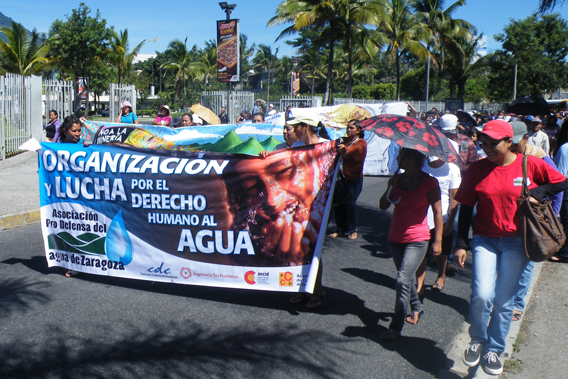 Demonstration in San Salvador, urging lawmakers to institute legislation ensuring the human right to water. Photo by: Robin Oisín Llewellyn. On hot days the broken stone and dried up silt from the San Sebastian mine in Eastern El Salvador bake in the sun. The slew of refuse is freckled with rock stained bright blue with […]
Demonstration in San Salvador, urging lawmakers to institute legislation ensuring the human right to water. Photo by: Robin Oisín Llewellyn. On hot days the broken stone and dried up silt from the San Sebastian mine in Eastern El Salvador bake in the sun. The slew of refuse is freckled with rock stained bright blue with […]
Dry forests disappearing faster than rainforests in Latin America
 Latin American countries lose 4% of dry forests in 9 years Click image to enlarge Countries across Latin America lost 78,000 square kilometers of subtropical and tropical dry broadleaf forests between 2001 and 2010, according to a new satellite-based assessment [PDF] published in the journal Biotropica. The research — based on analysis of data from […]
Latin American countries lose 4% of dry forests in 9 years Click image to enlarge Countries across Latin America lost 78,000 square kilometers of subtropical and tropical dry broadleaf forests between 2001 and 2010, according to a new satellite-based assessment [PDF] published in the journal Biotropica. The research — based on analysis of data from […]
Earth systems disruption: Does 2011 indicate the “new normal” of climate chaos and conflict?
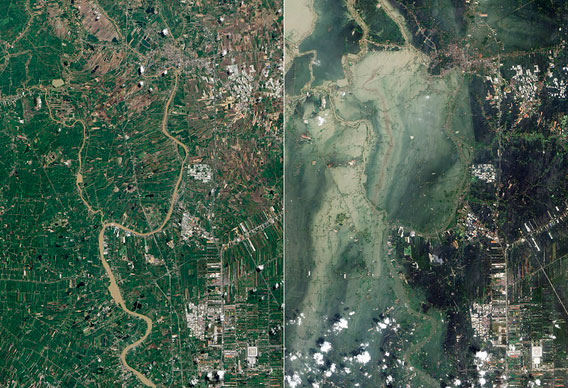 Before and after satellite images of flooding in Ayutthaya Province, Thailand. Photo by: NASA. The year 2011 has presented the world with a shocking increase in irregular weather and disasters linked to climate change. Just as the 2007 “big melt” of summer arctic sea ice sent scientists and environmentalists scrambling to re-evaluate the severity of […]
Before and after satellite images of flooding in Ayutthaya Province, Thailand. Photo by: NASA. The year 2011 has presented the world with a shocking increase in irregular weather and disasters linked to climate change. Just as the 2007 “big melt” of summer arctic sea ice sent scientists and environmentalists scrambling to re-evaluate the severity of […]
Climate change already worsening weird, deadly, and expensive weather
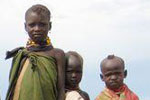 Unprecedented flooding in Thailand, torrential rains pummeling El Salvador, long-term and beyond-extreme drought in Texas, killer snowstorm in the eastern US—and that’s just the last month or so. Extreme weather worldwide appears to be both increasing in frequency and intensity, and a new report from the Intergovernmental Panel on Climate Change (IPCC) connects the dots […]
Unprecedented flooding in Thailand, torrential rains pummeling El Salvador, long-term and beyond-extreme drought in Texas, killer snowstorm in the eastern US—and that’s just the last month or so. Extreme weather worldwide appears to be both increasing in frequency and intensity, and a new report from the Intergovernmental Panel on Climate Change (IPCC) connects the dots […]
Good stewards of forests at home outsource deforestation abroad
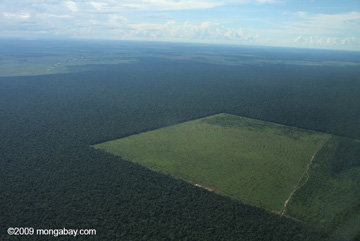 As more nations adopt better laws and policies to save and restore forests at home, they may, in fact, be outsourcing deforestation to other parts of the world, according to a new study in the Proceedings of the National Academy of Sciences (PNAS). Looking at six developing nations where forests are recovering—instead of receding—the study […]
As more nations adopt better laws and policies to save and restore forests at home, they may, in fact, be outsourcing deforestation to other parts of the world, according to a new study in the Proceedings of the National Academy of Sciences (PNAS). Looking at six developing nations where forests are recovering—instead of receding—the study […]
Assessing Tropical Butterfly Communities When Time Is Short
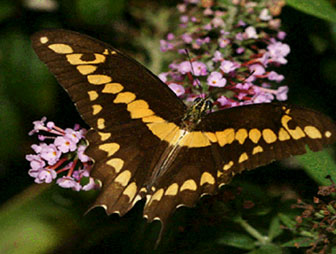 Butterflies can be used to quickly assess the conservation value of an area, report researchers writing in the journal Tropical Conservation Science. Timothy Bonebrake of Stanford University and Rubén Sorto of SalvaNATURA managed to sample 40-60% of the butterfly community in Playa El Icacal, El Salvador in just nine days. In the process, they identified […]
Butterflies can be used to quickly assess the conservation value of an area, report researchers writing in the journal Tropical Conservation Science. Timothy Bonebrake of Stanford University and Rubén Sorto of SalvaNATURA managed to sample 40-60% of the butterfly community in Playa El Icacal, El Salvador in just nine days. In the process, they identified […]
Can remittances and globalization help the environment?
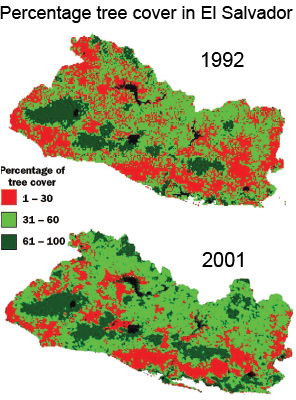 Can remittances and globalization help the environment? Can remittances and globalization help the environment? Rhett A. Butler, mongabay.com September 6, 2007 Globalization and other economic trends appear to be helping the degraded forests of El Salvador recover, reports new research that evaluated the impact of global trade, land policy changes, and remittances on forest cover. […]
Can remittances and globalization help the environment? Can remittances and globalization help the environment? Rhett A. Butler, mongabay.com September 6, 2007 Globalization and other economic trends appear to be helping the degraded forests of El Salvador recover, reports new research that evaluated the impact of global trade, land policy changes, and remittances on forest cover. […]
Forest fires burn in Central America
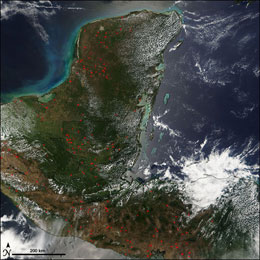 Forest fires burn in Central America Forest fires burn in Central America Rhett A. Butler, mongabay.com April 10, 2006 Hundreds of fires are burning across Central America according to NASA satellite images and reports from the ground. Fires have been detected in Mexico, Guatemala, El Salvador, Honduras, and Nicaragua. Every spring farmers use fires to […]
Forest fires burn in Central America Forest fires burn in Central America Rhett A. Butler, mongabay.com April 10, 2006 Hundreds of fires are burning across Central America according to NASA satellite images and reports from the ground. Fires have been detected in Mexico, Guatemala, El Salvador, Honduras, and Nicaragua. Every spring farmers use fires to […]
Red Tide Causes Sea Turtle Die-Off in El Salvador
 Red Tide Causes Sea Turtle Die-Off in El Salvador Red Tide Causes Sea Turtle Die-Off in El Salvador Wildlife Conservation Society March 23, 2006 A “Red Tide” event that occurred off the coast of El Salvador late last year directly caused the deaths of some 200 sea turtles, according to test results released today by […]
Red Tide Causes Sea Turtle Die-Off in El Salvador Red Tide Causes Sea Turtle Die-Off in El Salvador Wildlife Conservation Society March 23, 2006 A “Red Tide” event that occurred off the coast of El Salvador late last year directly caused the deaths of some 200 sea turtles, according to test results released today by […]
Poor aid response to storm damage in Central America
Weak aid response to tropical storm damage in Central America Poor aid response to storm damage in Central America mongabay.com October 5, 2005 Tropical storm Stan has killed more than 210 people across Central America, including more than 60 in El Salvador and 120 in Guatemala, but international aid has been slow to arrive in […]
El Salvador’s tropical storm damage worsened by deforestation
 El Salvador’s tropical storm damage worsened by deforestation El Salvador’s tropical storm damage worsened by deforestation Rhett A. Butler, mongabay.com October 4, 2005 Forest clearing on hillside in Central America Heavy rains and mudslides from Tropical Storm Stan have killed at least 60 people in El Salvador while more than 210 people across Central America […]
El Salvador’s tropical storm damage worsened by deforestation El Salvador’s tropical storm damage worsened by deforestation Rhett A. Butler, mongabay.com October 4, 2005 Forest clearing on hillside in Central America Heavy rains and mudslides from Tropical Storm Stan have killed at least 60 people in El Salvador while more than 210 people across Central America […]
Feeds: news | india | latam | brasil | indonesia
 Demonstration in San Salvador, urging lawmakers to institute legislation ensuring the human right to water. Photo by: Robin Oisín Llewellyn. On hot days the broken stone and dried up silt from the San Sebastian mine in Eastern El Salvador bake in the sun. The slew of refuse is freckled with rock stained bright blue with […]
Demonstration in San Salvador, urging lawmakers to institute legislation ensuring the human right to water. Photo by: Robin Oisín Llewellyn. On hot days the broken stone and dried up silt from the San Sebastian mine in Eastern El Salvador bake in the sun. The slew of refuse is freckled with rock stained bright blue with […] Latin American countries lose 4% of dry forests in 9 years Click image to enlarge Countries across Latin America lost 78,000 square kilometers of subtropical and tropical dry broadleaf forests between 2001 and 2010, according to a new satellite-based assessment [PDF] published in the journal Biotropica. The research — based on analysis of data from […]
Latin American countries lose 4% of dry forests in 9 years Click image to enlarge Countries across Latin America lost 78,000 square kilometers of subtropical and tropical dry broadleaf forests between 2001 and 2010, according to a new satellite-based assessment [PDF] published in the journal Biotropica. The research — based on analysis of data from […] Before and after satellite images of flooding in Ayutthaya Province, Thailand. Photo by: NASA. The year 2011 has presented the world with a shocking increase in irregular weather and disasters linked to climate change. Just as the 2007 “big melt” of summer arctic sea ice sent scientists and environmentalists scrambling to re-evaluate the severity of […]
Before and after satellite images of flooding in Ayutthaya Province, Thailand. Photo by: NASA. The year 2011 has presented the world with a shocking increase in irregular weather and disasters linked to climate change. Just as the 2007 “big melt” of summer arctic sea ice sent scientists and environmentalists scrambling to re-evaluate the severity of […] Unprecedented flooding in Thailand, torrential rains pummeling El Salvador, long-term and beyond-extreme drought in Texas, killer snowstorm in the eastern US—and that’s just the last month or so. Extreme weather worldwide appears to be both increasing in frequency and intensity, and a new report from the Intergovernmental Panel on Climate Change (IPCC) connects the dots […]
Unprecedented flooding in Thailand, torrential rains pummeling El Salvador, long-term and beyond-extreme drought in Texas, killer snowstorm in the eastern US—and that’s just the last month or so. Extreme weather worldwide appears to be both increasing in frequency and intensity, and a new report from the Intergovernmental Panel on Climate Change (IPCC) connects the dots […] As more nations adopt better laws and policies to save and restore forests at home, they may, in fact, be outsourcing deforestation to other parts of the world, according to a new study in the Proceedings of the National Academy of Sciences (PNAS). Looking at six developing nations where forests are recovering—instead of receding—the study […]
As more nations adopt better laws and policies to save and restore forests at home, they may, in fact, be outsourcing deforestation to other parts of the world, according to a new study in the Proceedings of the National Academy of Sciences (PNAS). Looking at six developing nations where forests are recovering—instead of receding—the study […] Butterflies can be used to quickly assess the conservation value of an area, report researchers writing in the journal Tropical Conservation Science. Timothy Bonebrake of Stanford University and Rubén Sorto of SalvaNATURA managed to sample 40-60% of the butterfly community in Playa El Icacal, El Salvador in just nine days. In the process, they identified […]
Butterflies can be used to quickly assess the conservation value of an area, report researchers writing in the journal Tropical Conservation Science. Timothy Bonebrake of Stanford University and Rubén Sorto of SalvaNATURA managed to sample 40-60% of the butterfly community in Playa El Icacal, El Salvador in just nine days. In the process, they identified […] Can remittances and globalization help the environment? Can remittances and globalization help the environment? Rhett A. Butler, mongabay.com September 6, 2007 Globalization and other economic trends appear to be helping the degraded forests of El Salvador recover, reports new research that evaluated the impact of global trade, land policy changes, and remittances on forest cover. […]
Can remittances and globalization help the environment? Can remittances and globalization help the environment? Rhett A. Butler, mongabay.com September 6, 2007 Globalization and other economic trends appear to be helping the degraded forests of El Salvador recover, reports new research that evaluated the impact of global trade, land policy changes, and remittances on forest cover. […] Forest fires burn in Central America Forest fires burn in Central America Rhett A. Butler, mongabay.com April 10, 2006 Hundreds of fires are burning across Central America according to NASA satellite images and reports from the ground. Fires have been detected in Mexico, Guatemala, El Salvador, Honduras, and Nicaragua. Every spring farmers use fires to […]
Forest fires burn in Central America Forest fires burn in Central America Rhett A. Butler, mongabay.com April 10, 2006 Hundreds of fires are burning across Central America according to NASA satellite images and reports from the ground. Fires have been detected in Mexico, Guatemala, El Salvador, Honduras, and Nicaragua. Every spring farmers use fires to […] Red Tide Causes Sea Turtle Die-Off in El Salvador Red Tide Causes Sea Turtle Die-Off in El Salvador Wildlife Conservation Society March 23, 2006 A “Red Tide” event that occurred off the coast of El Salvador late last year directly caused the deaths of some 200 sea turtles, according to test results released today by […]
Red Tide Causes Sea Turtle Die-Off in El Salvador Red Tide Causes Sea Turtle Die-Off in El Salvador Wildlife Conservation Society March 23, 2006 A “Red Tide” event that occurred off the coast of El Salvador late last year directly caused the deaths of some 200 sea turtles, according to test results released today by […] El Salvador’s tropical storm damage worsened by deforestation El Salvador’s tropical storm damage worsened by deforestation Rhett A. Butler, mongabay.com October 4, 2005 Forest clearing on hillside in Central America Heavy rains and mudslides from Tropical Storm Stan have killed at least 60 people in El Salvador while more than 210 people across Central America […]
El Salvador’s tropical storm damage worsened by deforestation El Salvador’s tropical storm damage worsened by deforestation Rhett A. Butler, mongabay.com October 4, 2005 Forest clearing on hillside in Central America Heavy rains and mudslides from Tropical Storm Stan have killed at least 60 people in El Salvador while more than 210 people across Central America […]